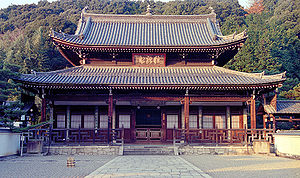Mampuku-ji
| Manpuku-ji 萬福寺 |
|
|---|---|

Manpuku-ji
|
|
| Basic information | |
| Location | 34 Samban-wari, Gokanosho, Uji, Kyoto Prefecture |
| Affiliation | Ōbaku |
| Country | Japan |
| Website | http://www.obakusan.or.jp/ |
| Architectural description | |
| Founder | Yinyuan Longqi (Ingen), Muyan |
| Completed | 1661 |
Ōbaku-san Manpuku-ji (黄檗山萬福寺 Manpuku Temple on Mt. Ōbaku?) is a temple located in Uji, Kyoto. It is the head temple of the Japanese Ōbaku Zen sect, named after Wanfu Temple in Fujian, China. The mountain is likewise named after Mount Huangbo, where the Chinese temple is situated.
The temple was founded in 1661 by the Chinese monk Yinyuan Longqi (Ingen) and his disciple Muyan.
In 1664 control of the temple passed to Muyan, after many Chinese monks followed as head priests. Only the fourteenth priest and his successors are Japanese.
The temple structures were constructed in Ming China's architectural style.
The arrangement of buildings also follows Ming Dynasty architectural style, representing an image of a dragon.
The temple features an exemplary gyoban (fish board, used to toll the hours).
The temple treasure house contains a complete collection of Buddhist scriptures completed in 1678 and comprising approximately 60,000 printing blocks, which are still in use. The production of the printing blocks was funded by donations collected throughout the country for many years.
The temple's main statue is a seated Gautama Buddha.
Sculptures by the Chinese sculptor known as Han Do-sei and latticed balustrades can also be seen.
Gate
Altar to Kansei Teikun
Statue of Hotei
Coordinates: 34°54′50″N 135°48′27″E / 34.91389°N 135.80750°E
...
Wikipedia
